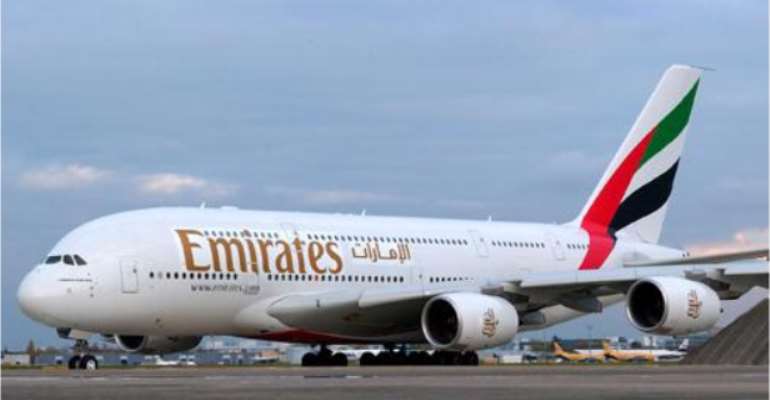Tough Time For Dubai Travellers As Emirates Reduces Flights

Many Nigerian travellers to Dubai, a popular business and holiday destination, may find themselves taking the long route there in the summer peak season which has just begun as Emirates Airline, which usually operates two direct flights daily into Lagos with its B777-300, has reduced its schedule to one flight per week.
This means the airline will have on offer less than its usual 598 seats to Dubai daily.
Emirates originally operated one flight per day from Nigeria to Dubai but stepped up to two, in response to a swell in passenger numbers.
Emirates management explains that the reduction is due to runway upgrading at Dubai International, which took effect from May 1 and will last till July 20, 2014, being a period of 80 days.
Dubai is destination for many Nigerian businessmen and women as well as a popular holiday destination and an air travel connection hub for travellers to Europe and America. It also has a growing population of Nigerian students (about 5,000) pursuing tertiary education.
Many Nigerian traders also source their stock of gold and clothing from there because it is a tax-free zone, which makes the costs lower. Goods imported from Dubai to Nigeria include household items, pharmaceuticals and building materials.
Emirates flights used to depart Lagos at 2pm and 8pm, but only the night flight is available now at 8:50pm. Nigerian travellers unable to catch the single daily flight will have to travel on other airlines.
Qatar Airways, Royal Jordanian Airline and Etihad Airways, are the three airlines that operate into Lagos from the Mid-East and United Arabs Emirates.
Many Dubai route travellers who spoke to BusinessDay expressed concern that Emirates was cutting down on seats in the summer period when traffic peaks and many people are travelling and connecting flights through Dubai. Emirates is the only airline that flies directly from Nigeria to Dubai.
'I think it's just for a short period but it's still not too convenient for travellers, especially me, as I deal in electronics and I can decide to book on their flights anytime. I can't just do that now because any little time wasted means no available seat,' said John Ibe, a traveller who was at the airport to confirm his ticket.
Another traveller who is a frequent flier on the airline said he had to travel with Etihad Airways some days ago to connect Dubai via Abu Dhabi.
'We are still going to 80 days and I think the situation will continue. Unfortunately, it is coming at this time when you see passengers thronging the airports. For some who may not get seats on the only available flight, they may have to connect, but it means more time and probably more money,' Funsho Ibidapo said.
In 2013 alone, more than 12,000 tonnes of cargo, ranging from household goods to pharmaceuticals and construction equipment, were imported into Nigeria using Emirates SkyCargo services.
In 2005, just over a year after Emirates launched in Nigeria, it increased services from four to six flights a week, and following steady growth and demand, it became a daily operation in October 2005.
In 2009, a second daily service was introduced, while each flight was served with a Boeing 777-300ER. The Boeing 777-300ER is the backbone of the Emirates fleet, efficient to operate and popular amongst customers.
The airline had in the last 10 years airlifted 2.6 million passengers on the Lagos-Dubai route. It realised at least N22.4 billion in tickets sales in Nigeria in 2012, against the N30.5 billion it earned in 2011, according to the Nigerian Civil Aviation Authority.
Speaking on the current situation, Nair Manoj, country manager of the Emirates, said in Lagos, 'We will have to manage the traffic because of the situation. We have to cut the flights because of the upgrade, but there will be no much effect on our summer operations; passengers can still book for their two daily flights from July 16.'
Tim Clark, president of Emirates Airline, who also commented, said these changes would not impact customers booked to fly between May and July, as the flight schedules had been planned and implemented months ahead of time.
Clark added that customers or travel agents searching for flight options on Emirates would only see those flights that were available.
'Customers who have booked to fly with us, or are considering to fly with us during this time, can be assured that it is business as usual. On routes where Emirates has had to reduce frequency, we have upgraded to bigger aircraft where possible to recover part of the capacity,' Clark said.
'We have done a lot of preparation work behind the scenes, together with all airport stakeholders, to ensure that there will be as little inconvenience to our customers as possible, and we look forward to resuming our full schedule of flights in July. As the biggest operator at Dubai International, accounting for about 50 percent of traffic, of course we have had to take the biggest hit in reducing flights. There will be an impact on our revenues to the tune of approximately AED1 billion (over N44 billion),' he said.
He said they understand the need for the upgrading work to be done and support it wholeheartedly. 'It will add much-needed capacity to the airport, and having world-class infrastructure ultimately means a better experience for customers. So we have to take the long-term view and manage the short term pain,' he added.
During the period, Emirates will ground 20 aircraft in May, 22 in June, and 22 in July, as Dubai Airports launch a comprehensive runway upgrade project which will see both runways at Dubai International close alternatively for resurfacing and other enhancement work.
BUSINESSDAY
